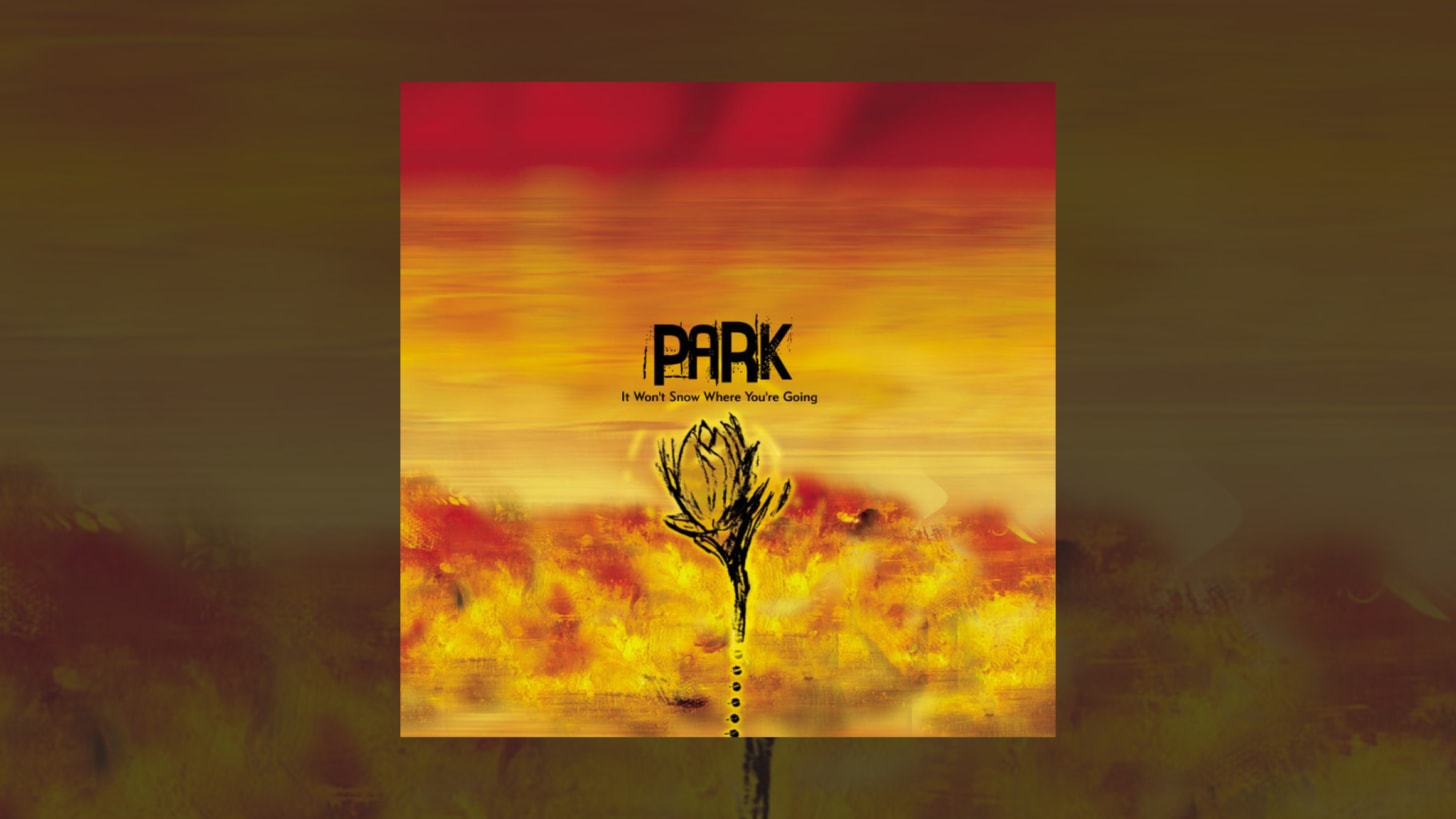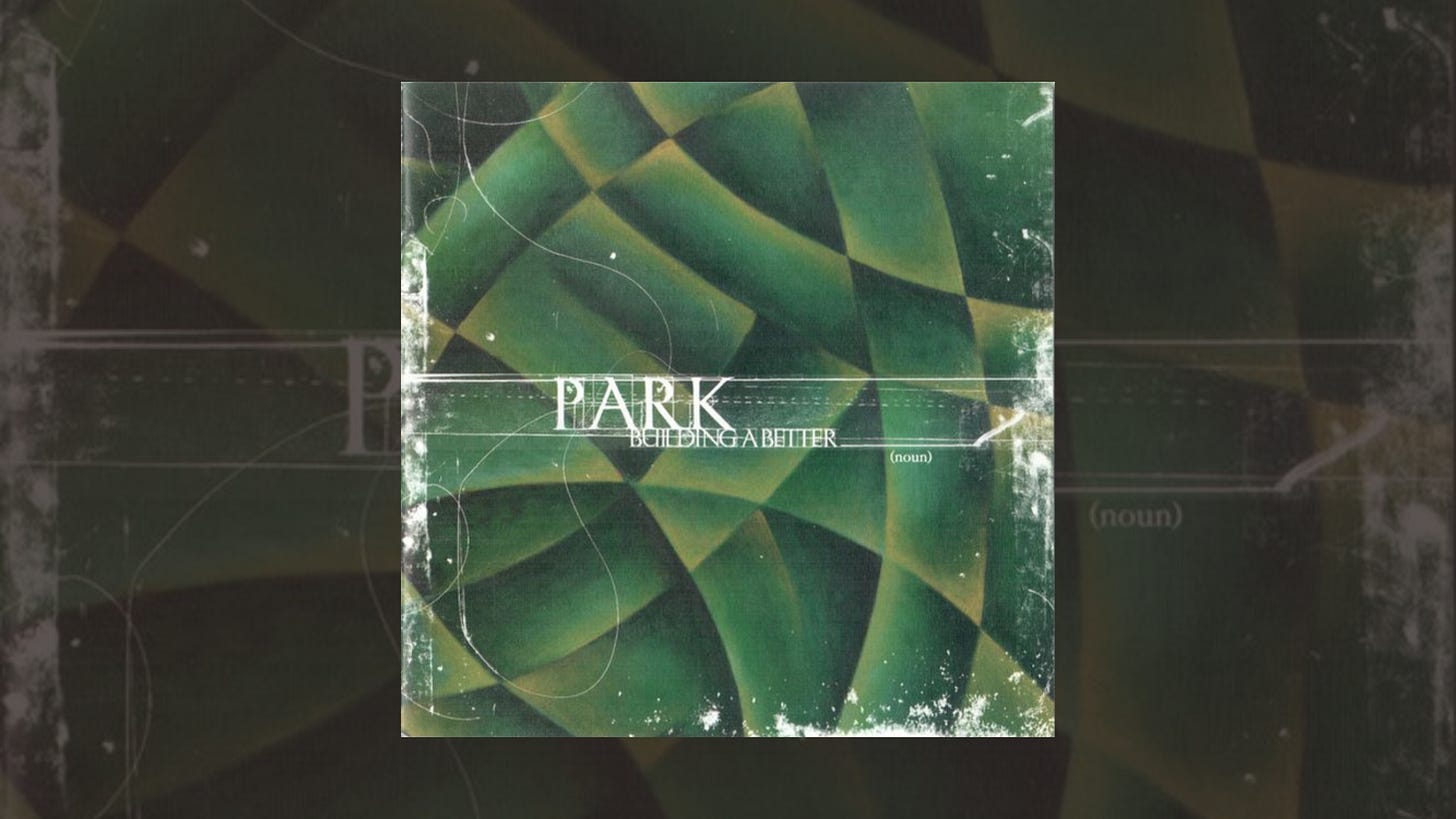Park
Post Hardcore and Emo's Missing Link
Few bands manage to endure the test of time like Park and maintain operations for over two decades. Formed in Springfield, Illinois, in the late 1990s, Park quickly established a unique sound, combining emotionally charged lyrics with wild, genre-defying guitar work. Arguably, part of the band’s longevity comes from the consistent presence of guitarist and songwriter Ladd Mitchell, the sole member present for each era of the band since joining.
I spoke with Ladd about the band’s origin story, their evolution, and the creative spark that keeps Park thriving nearly three decades later. Plus, bonus literary content when we talk about Ladd’s new book (out now).
Ladd Mitchell was also a recently guest on This Was the Scene Podcast - be sure to give a listen!
An Accidental Beginning
Park’s story began in, unsurprisingly, a literal park. Douglas Park in Springfield, Illinois, to be specific. Mitchell, then playing in a band called Dirty Sarah, stumbled upon Park’s early incarnation as a three-piece act with Jon Heupel, Justin Valenti, and Eric Lipe. “I watched their set and thought it was really interesting,” Ladd said. “You could tell they were still trying to figure things out, but I think I was able to see through that and see the cooler parts of their songs. I knew all three from school, so I just approached them like, ‘You guys need another guitar player?’”
That moment led to Mitchell joining Park, learning their songs from a demo tape, and thus kicking off the band’s formative years. Early releases like the Mood Ring 7-inch marked Park’s raw, exploratory phase, a sound closer to Sunny Day Real Estate than the guitar-heavy Midwest-flavored post hardcore they’d later become known for. “It doesn’t really sound like Park as people know it today,” Ladd said of those early recordings.
The band’s first tour was a chaotic disaster, with arguments and logistical mishaps culminating in Heupel’s departure. Despite friction and frustration, Ladd ended up playing with a young, persistent drummer named Miles who reinvigorated the band, eventually recruiting Valenti back into the lineup as well. This led to the creation of No Signal. “We were just noodling around, and me and Justin came up with the idea, ‘Why don’t we just keep doing Park?’” Mitchell said. “Those songs evolved into No Signal.”
It Won’t Snow Where You’re Going, Park’s second LP, saw No Signal’s producer Cameron Webb return. The sophomore record had more polished production that enhanced the band’s signature dual-guitar interplay and making the layered textures more obvious. Tracks like “Gasoline Kisses for Everyone” or “Numerous Murders” feature soaring, epic choruses set against Mitchell’s raw, heartfelt vocals, which balance introspective lyricism about personal struggle and fleeting moments of hope with a universal message of newfound accessibility.
This refined sound, less chaotic than No Signal but still dynamic, solidified Park’s place in the early 2000s emo and post-hardcore scene, earning them a dedicated following, including future members of the Junior Varsity.
A Junior Aside
I first learned about Park from fellow midwesterner Nick Dodson from The Junior Varsity, a band Park has a close relationship with. “Nick is one of my favorite people,” Ladd said. Park and TJV both came up in the early 2000s Midwest emo and post-hardcore scene, and met through the interconnected Jacksonville/Springfield, Illinois music community.
Ladd remembered Park booking the then-emerging Junior Varsity for shows to help them gain exposure, fostering a bond that grew through shared tours, including a 2006 Canada run where TJV’s Andy Wildrick filled in for Park (reprising his role from the early days of the band). This friendship, built on mutual respect and a shared DIY ethos, has remained, with both bands planning shows together in 2025 in St. Louis and Bloomington.
Park’s Unique and Consistent Sound
Park’s distinctive sound, a blend of angular, intricate guitar interplay, raw emotional vocals, and dynamic post-hardcore energy, set them apart from peers. Formed in the wake of early 1990s post-hardcore pioneers like Drive Like Jehu, whose dissonant, riff-heavy complexity on albums like Yank Crime (1994) laid the groundwork for intricate guitar-driven punk, Park took a more melodic path. By the time of their debut LP No Signal in 2001, the band cemented a sound that combined Drive Like Jehu’s jagged dual-guitar attack with emo’s budding emotional core.
Park’s blend of influences set them on a parallel course with other late-1990s bands like At The Drive-In. Where ATDI’s explosive, rhythmically complex Relationship of Command took post-hardcore to the edge in one direction, Park maintained a tighter, more accessible emo-pop sound, balancing urgency with melodic hooks. This sound shows up again in later bands like Saosin, Finch, or Alexisonfire, to name a few.
Park’s unique sonic identity and active touring cultivated a dedicated fanbase, ensuring Park’s relevance in the emo and post-hardcore scene even as the genre evolved throughout the 2000s.
Despite frequent lineup changes, particularly on bass, Park’s sound has remained remarkably consistent. “The core was still the same,” Mitchell said, crediting the band’s ability to evolve without losing its identity. Albums like 2006’s Building a Better and 2014’s Jacob the Rabbit EP showcase Park’s ability to blend punk intensity with intricate, layered songwriting. Mitchell pointed out subtle differences from album to album, particularly in the basslines, which vary in style. “If you listen to just the bass, it’s different,” he said. “It lends a good variety between the albums.”
The eight year gap between Building It Better and Jacob the Rabbit marked a notable shift, largely due to production changes. While Cameron Webb was behind the band’s earlier records, Jacob the Rabbit was recorded with Josh Barber in Kansas City and mixed by Beau Burchell of Saosin. “It was a different flavor of someone else mixing,” Mitchell said, likening the switch to “cheating on a girlfriend” after years of working with Webb (not making light of cheating, but emphasizing their relationship with Webb).
The result was a more polished sound that Mitchell credits to Bell’s unique mixing style. “It was a risk, but we were all really happy with it.” While retaining Park’s angular guitar interplay, raw vocals, and layered instrumentation, the EP introduces denser production, shimmering delays, and melodic clarity closer to Saosin, balancing their signature jagged sound with accessible hooks.
Songwriting Lessons and Creative Growth
Park’s evolution as songwriters reflects a shift toward simplicity and cohesion. Early on, producer Cameron Webb taught them a valuable lesson during No Signal’s pre-production: a song doesn’t need ten cool parts to be effective. “He’d say, ‘You guys have ten parts in this song that you’re just trying to push together because they’re cool,’” Mitchell remembered. “It can be four parts that just fit together really well.” This advice has guided Park’s recent work, as they strive for catchy, tight structures over flashy, noodly riffs (though there’s still plenty of that).
Mitchell’s creative process extends beyond music. He’s also a novelist, with his debut book, Theory Markspurn, available now. Inspired by his wife’s experience as a collegiate volleyball player, the novel explores the mental and emotional toll of high-performance athletics, a topic rarely addressed in sports literature. “There’s no literary heroes for volleyball,” Mitchell said, noting the sport’s growing popularity. The novel, described as “Rudy meets Black Swan,” delves into the psychological unraveling of a D1 athlete, drawing from personal observations and a desire to fill a gap in fiction.
This storytelling instinct also shaped Jacob the Rabbit, which was initially conceived as a musical companion to an unfinished novel. “I wanted it to tell the first two or three chapters of that story,” Mitchell said. Though the novel didn’t fully materialize, the experience informed his approach to both music and writing, emphasizing the importance of learning through failure.
Gear and the Park Sound
For gear nerds, Ladd’s setup is a key ingredient in Park’s distinctive sound. His primary guitar, a Mexican-made Fender Toronado with high-output pickups, pairs with a rare Hiwatt DR504 amp from the early ’80s. “It’s naturally gainy,” he said, contrasting it with the JCM900 used by bandmate Alex and previously by Valenti. The combination of Mitchell’s bass-heavy, distorted tone and Alex’s mid-range clarity creates a balanced, powerful sound that defines Park’s recordings.
Recently, Ladd added a Quad Cortex amp modeler to his arsenal, primarily for live performances. “It’s insane,” he said, praising its ability to seamlessly switch between clean and dirty tones with reverb, delay, and EQ settings. Inspired by Alkaline Trio’s Matt Skiba, Mitchell’s clean channel is simply his Toronado turned down via a volume pedal, a technique he’s used for two decades.
Roots in Punk and Beyond
Mitchell’s musical journey began at 13, learning guitar alongside his older brother with a heavy diet of Metallica, Megadeth, and Slayer. “It’s ironic because as a guitar player who’s just starting, it’s like saying, ‘I can’t do anything, and I want to do some of the hardest stuff,’” he laughed. This metal foundation gave way to punk rock influences like Green Day, The Queers, and Jawbreaker, as well as the nascent Midwest emo scene. Bands like Braid and American Football, with their herky-jerky rhythms and raw aesthetic, left a lasting impression. “They were practitioners of deliberate amateurism,” Mitchell said, admiring the unpolished creativity of the era.
Today, Mitchell’s listening habits lean toward shoegaze, citing bands like the Greeting Committee and the Jealous Sound. “I listen to really mellow stuff, but then I play this rock and roll stuff,” he said, laughing at the contrast. This eclectic taste subtly informs Park’s music, though Mitchell is careful not to overwhelm their sound with his shoegaze inclinations. “I sneak it in,” he admitted, noting that simpler, lyrically driven songs often face pushback from bandmates who crave complexity.
Looking Ahead
As Park prepares for a string of shows with the Junior Varsity and Tokyo Rose, and Boys Night Out to celebrate the 20th anniversary of Trainwreck, Ladd hinted at “surprises” on the horizon. “We got some tricks up our sleeve,” he teased, keeping details under wraps but discussing new music that weaves in elements of his novelistic storytelling.
Reflecting on Park’s journey, Mitchell sees their resilience as a product of camaraderie and adaptability. “We were fortunate getting people who we jelled with,” he said, emphasizing the importance of personality over technical skill in their revolving lineups. From basement shows to cross-country tours, Park’s story is one of persistence, creativity, and a commitment to their unique sound over genre conventions.
Stay tuned to their Instagram and X profiles for updates, and keep an ear out for Park’s next chapter.





